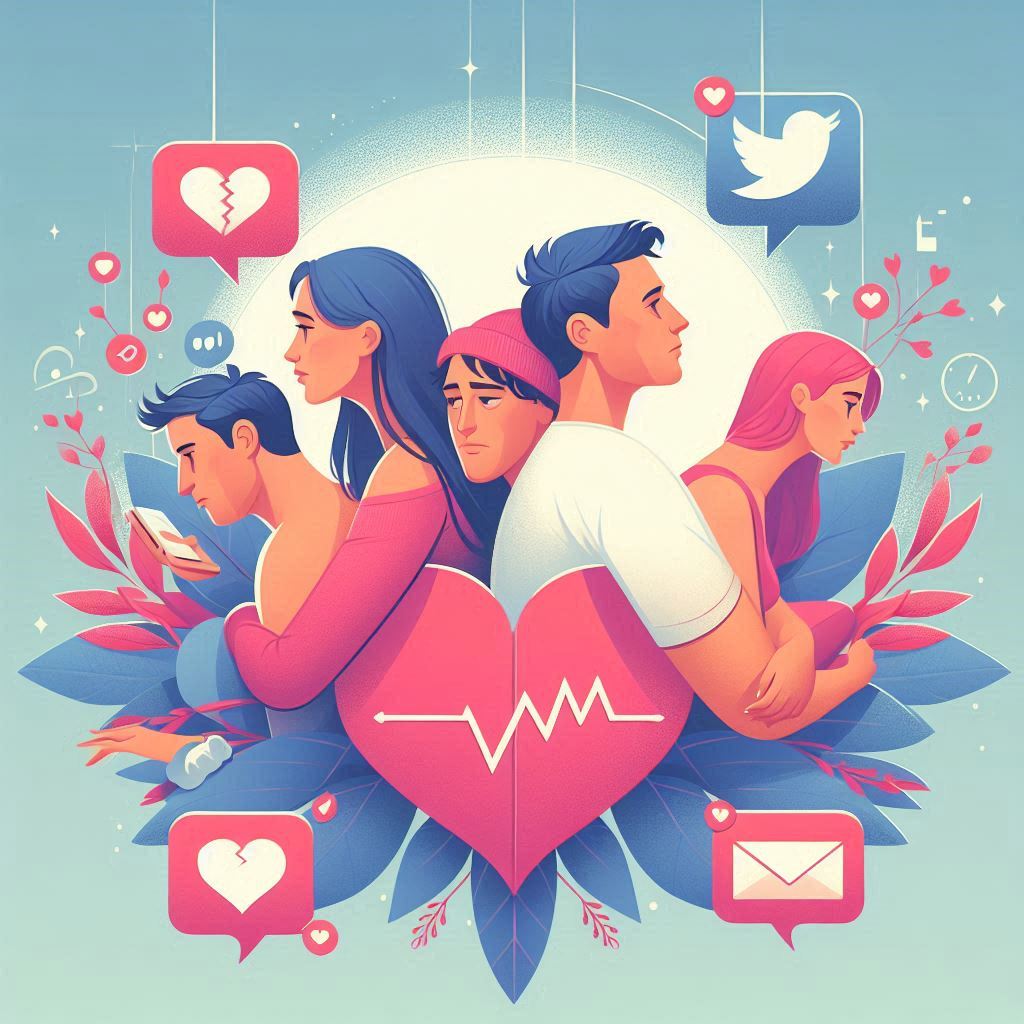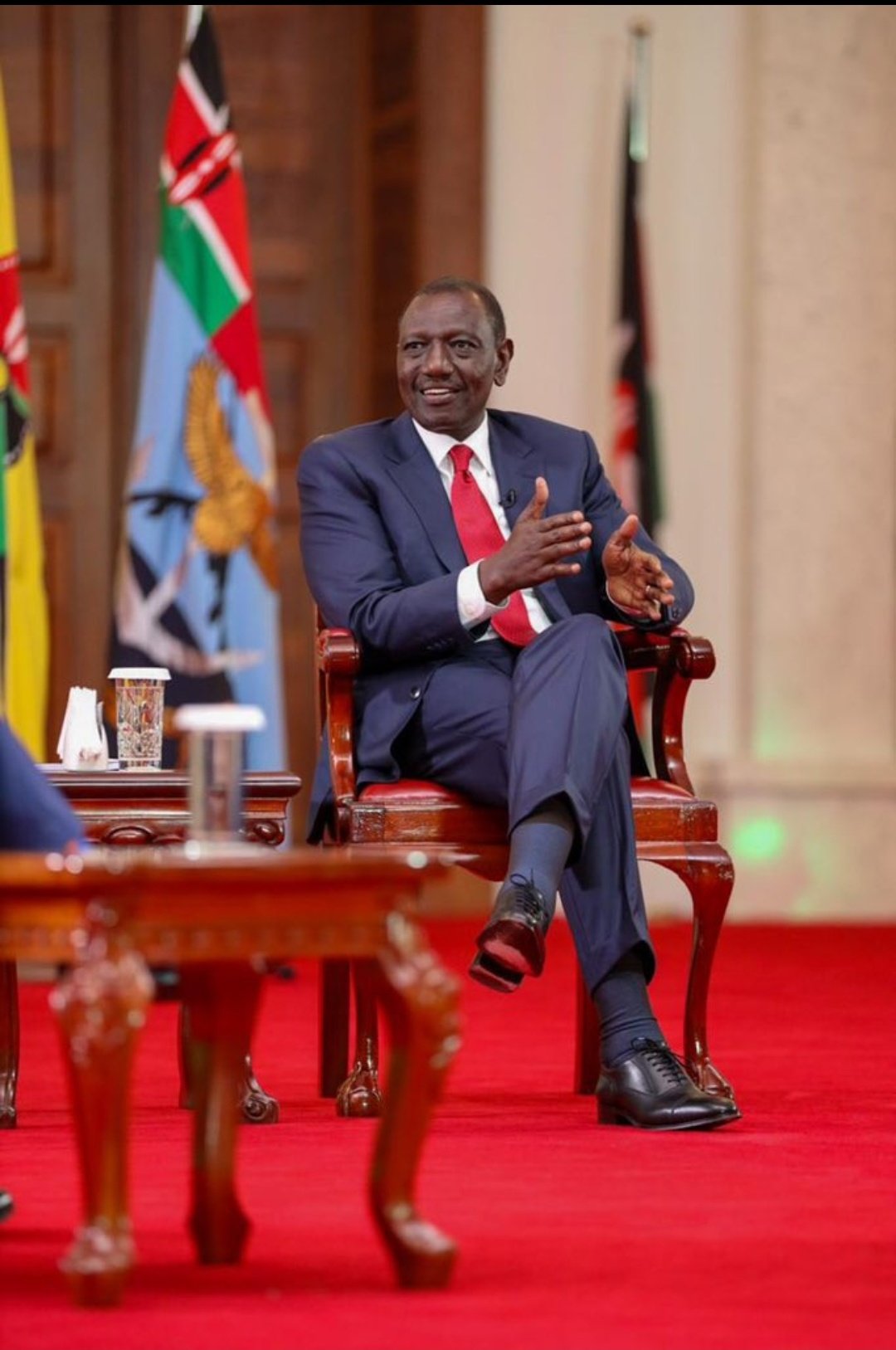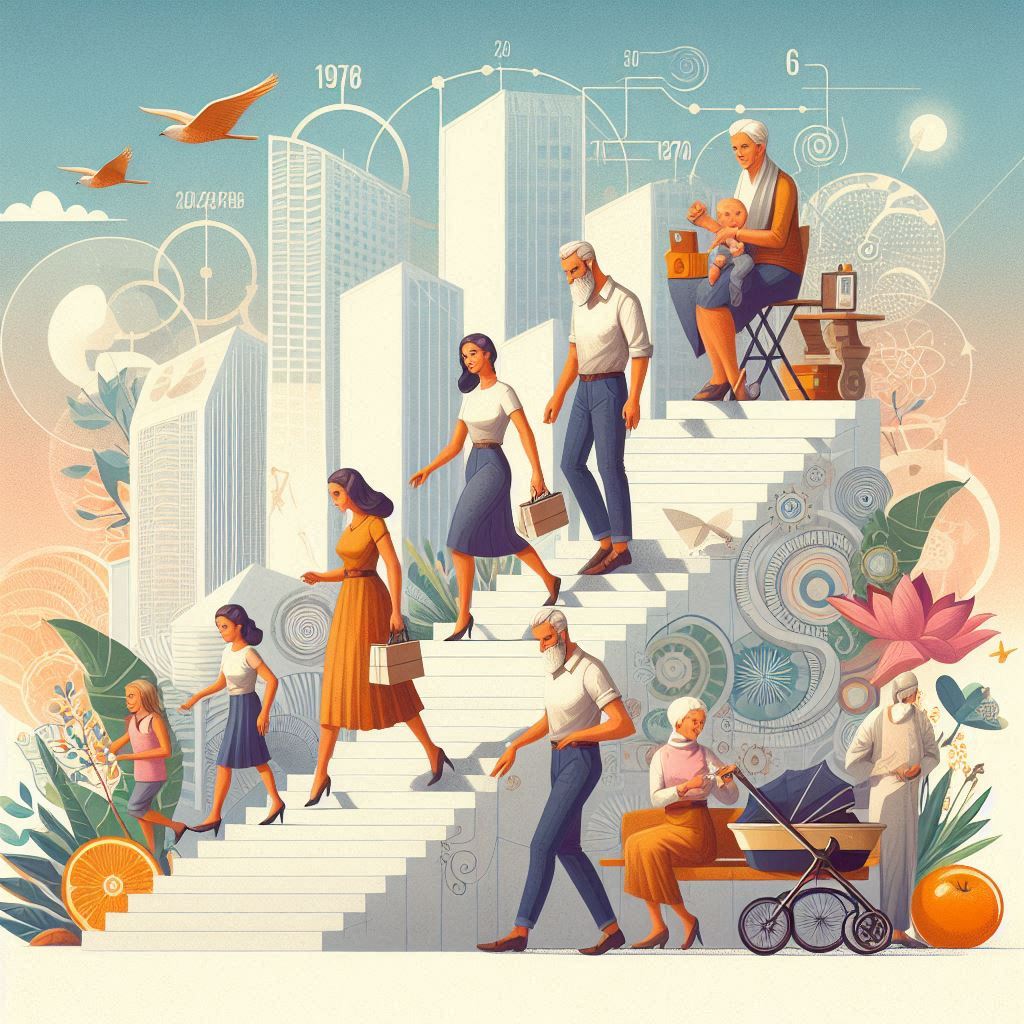
In the ever-evolving landscape of human interaction, few aspects have undergone as dramatic a transformation as romantic relationships. The digital age, with its myriad technologies and platforms, has reshaped how we meet, communicate, fall in love, and sometimes, part ways. This comprehensive exploration delves into the intricacies of modern-day relationships and breakups, examining the factors that influence them, the challenges they face, and the strategies for navigating this complex terrain.



Table of Contents
- The Digital Revolution in Dating
- The Paradox of Choice
- Communication in the Digital Age
- The Impact of Social Media on Relationships
- Changing Expectations and Relationship Dynamics
- The Rise of Non-Traditional Relationships
- Modern Breakups: The Digital Dilemma
- Healing and Moving On in the Digital Age
- The Future of Relationships
- Conclusion
The Digital Revolution in Dating
The advent of dating apps and websites has fundamentally altered the landscape of romantic encounters. Gone are the days when meeting a potential partner was limited to chance encounters, introductions through friends, or local social gatherings. Today, with a few swipes or clicks, individuals can connect with potential partners from across the city or even across the globe.
The Rise of Dating Apps
Dating apps like Tinder, Bumble, and Hinge have become ubiquitous in the modern dating scene. According to a 2019 study by Stanford University, online dating has become the most common way for heterosexual couples to meet in the United States, surpassing traditional methods like introductions through friends or meeting at bars and restaurants.
These platforms offer several advantages:
- Increased Accessibility: Users can browse potential matches at any time, from anywhere.
- Wider Pool of Potential Partners: Apps allow users to connect with people they might never have encountered in their daily lives.
- Efficient Filtering: Many apps allow users to filter potential matches based on specific criteria, potentially saving time and emotional energy.
However, this digital revolution in dating also comes with its own set of challenges:
- Superficiality: The emphasis on photos and quick decisions can lead to superficial judgments.
- Overwhelm: The sheer number of options can be overwhelming and lead to decision fatigue.
- Misrepresentation: The ease of creating online profiles can lead to instances of catfishing or misrepresentation.
The Impact on Traditional Dating
While digital platforms have become dominant, they haven’t entirely replaced traditional dating methods. Many people still value organic, in-person encounters. However, the prevalence of dating apps has changed expectations and behaviors even in offline dating scenarios.
For instance, the concept of “sliding into DMs” (direct messages) has become a common way to express interest, even if the initial meeting was in person. Additionally, the fast-paced nature of app-based dating has influenced the overall pace of courtship, with many people expecting quicker progression in relationships.
The Paradox of Choice
One of the most significant impacts of modern dating technology is the vast increase in potential partners available to an individual. While this might seem like an unequivocal positive, research suggests it can lead to what psychologists call the “paradox of choice.”
Too Many Fish in the Sea?
In his book “The Paradox of Choice,” psychologist Barry Schwartz argues that an abundance of options can lead to:
- Decision Paralysis: When faced with too many choices, people often struggle to make a decision at all.
- Decreased Satisfaction: Even after making a choice, people may feel less satisfied, wondering if they made the best possible decision.
- Increased Expectations: With so many options available, people may develop unrealistic expectations of finding a “perfect” match.
In the context of modern relationships, this paradox can manifest in several ways:
- Constant Swiping: Some users find themselves endlessly swiping through profiles, always wondering if the next one might be better.
- Fear of Commitment: With the perception that there are always more options available, some individuals may be reluctant to commit to a single partner.
- Grass is Greener Syndrome: Even in committed relationships, the awareness of other potential partners can lead to questioning and doubt.
Quality vs. Quantity
To navigate this paradox, many relationship experts advocate for a shift in focus from quantity to quality. This might involve:
- Limiting Options: Some dating apps, like Coffee Meets Bagel, intentionally limit the number of potential matches presented each day.
- Deeper Profiles: Platforms like OkCupid encourage users to answer in-depth questions, facilitating more meaningful connections.
- Mindful Dating: Encouraging users to be more intentional about their dating choices, focusing on compatibility and shared values rather than endless options.
Communication in the Digital Age
The way we communicate in relationships has undergone a seismic shift with the advent of digital technologies. From texting and instant messaging to video calls and social media posts, the avenues for interaction are more diverse than ever before.
The Pros and Cons of Digital Communication
Pros:
- Constant Connection: Partners can stay in touch throughout the day, sharing moments and maintaining intimacy even when physically apart.
- Ease of Expression: For some, texting or writing allows for more thoughtful and articulate expression of feelings.
- Record Keeping: Digital communication provides a record of conversations, which can be both a blessing and a curse.
Cons:
- Misinterpretation: Without tone of voice or body language, messages can be easily misunderstood.
- Pressure to Respond: The expectation of immediate responses can create stress and anxiety.
- Reduced Face-to-Face Interaction: Overreliance on digital communication can lead to a decrease in meaningful in-person interactions.
The Importance of Digital Literacy in Relationships
As digital communication becomes increasingly central to modern relationships, developing “digital literacy” in the context of romance is crucial. This involves:
- Understanding Platform Norms: Different platforms have different expectations. A text might warrant a quicker response than a Facebook message, for instance.
- Recognizing Tone: Learning to convey and interpret tone in written messages to avoid misunderstandings.
- Setting Boundaries: Establishing healthy boundaries around digital communication, such as “no phones during date night.”
The Role of Video Calls
The COVID-19 pandemic accelerated the adoption of video calling in romantic relationships. Platforms like Zoom, FaceTime, and Skype became essential tools for couples separated by distance or lockdowns. This trend has continued, with many couples incorporating regular video calls into their communication repertoire, especially in long-distance relationships.
The Impact of Social Media on Relationships
Social media platforms like Facebook, Instagram, and Twitter have become integral to many people’s daily lives, and their influence extends deeply into romantic relationships.
Public Display of Relationships
The concept of “Facebook Official” – declaring a relationship status on social media – has become a significant milestone for many couples. This public acknowledgment can bring both positive and negative effects:
Positive:
- Affirmation of commitment
- Sharing joy with friends and family
- Creating a shared digital narrative of the relationship
Negative:
- Pressure to perform or present an idealized version of the relationship
- Privacy concerns
- Potential for jealousy or comparison with other couples
Social Media and Jealousy
Social media can be a breeding ground for jealousy in relationships. Issues may arise from:
- Likes and Comments: Interactions with ex-partners or attractive individuals can spark insecurity.
- Ambiguous Posts: Vague status updates or check-ins can lead to suspicion.
- Comparison: Seeing idealized portrayals of other relationships can lead to dissatisfaction with one’s own.
A 2013 study published in the journal “Cyberpsychology, Behavior, and Social Networking” found that excessive Facebook use was positively correlated with negative relationship outcomes like cheating, breakup, and divorce.
Digital Footprints and Relationship History
Unlike previous generations, modern couples often have their entire relationship history documented on social media. This can create challenges:
- Difficulty Moving On: After a breakup, the digital remnants of the relationship can make it harder to heal.
- New Partner Insecurity: A new partner might feel insecure seeing the documented history with an ex.
- Privacy Concerns: The public nature of social media can make it difficult to keep certain aspects of the relationship private.
Changing Expectations and Relationship Dynamics
The digital age, coupled with broader societal shifts, has led to significant changes in relationship expectations and dynamics.
Shifting Gender Roles
Traditional gender roles in relationships have been evolving for decades, but the digital age has accelerated this change:
- Financial Independence: With increased career opportunities, there’s less emphasis on traditional breadwinner roles.
- Domestic Responsibilities: There’s a growing expectation of shared household duties.
- Emotional Labor: There’s more recognition of the importance of emotional support from all partners, regardless of gender.
Delayed Milestones
Compared to previous generations, modern couples are often reaching traditional relationship milestones later:
- Marriage: The average age for first marriages has been steadily increasing.
- Children: Many couples are choosing to have children later or not at all.
- Home Ownership: Economic factors have led to delayed home ownership for many couples.
These shifts can create tension between generational expectations and modern realities.
The Expectation of Constant Growth
The self-improvement culture, amplified by social media, has led to an increased expectation of constant personal and relationship growth. While this can be positive, it can also create pressure and unrealistic standards.
The Rise of Non-Traditional Relationships
The digital age has facilitated greater awareness and acceptance of diverse relationship structures.
Polyamory and Ethical Non-Monogamy
With platforms dedicated to non-monogamous dating and increased visibility in media, polyamory and other forms of consensual non-monogamy have gained more mainstream recognition.
Long-Distance Relationships
Digital communication has made long-distance relationships more feasible than ever before. Video calls, instant messaging, and even long-distance sex toys have changed the landscape of geographically separated couples.
LGBTQ+ Relationships
Dating apps and online communities have provided crucial platforms for LGBTQ+ individuals to connect, especially in areas where open expression might be challenging or dangerous.
Modern Breakups: The Digital Dilemma
Just as technology has transformed how relationships begin and develop, it has also significantly impacted how they end.
The Phenomenon of “Ghosting”
“Ghosting” – the practice of abruptly cutting off all communication without explanation – has become a common, albeit controversial, way of ending romantic entanglements. The ease of disconnecting in the digital world has made this practice more prevalent.
A 2018 study published in the Journal of Social and Personal Relationships found that about 25% of participants had been ghosted by a partner, and about 20% had ghosted someone themselves.
Digital Stalking and Obsession
The accessibility of information online can make it tempting for individuals to continue monitoring their ex-partners’ lives post-breakup. This digital stalking can hinder the healing process and, in extreme cases, lead to harassment.
The Challenge of Digital Decoupling
Modern breakups often involve a complex process of digital separation:
- Social Media Cleanup: Deciding whether to unfriend, unfollow, or block an ex on various platforms.
- Photo Management: Dealing with shared photos and memories posted online.
- Password Changes: Updating passwords for shared accounts or devices.
- Digital Asset Division: Deciding how to handle shared digital purchases, subscriptions, or accounts.
The “Social Media Cleanse”
Many individuals choose to take a break from social media following a breakup, recognizing the potential for increased emotional distress from continued online exposure to their ex-partner’s life.
Healing and Moving On in the Digital Age
While technology can complicate the process of healing after a breakup, it also offers new tools and strategies for moving forward.
Online Support Communities
Forums, subreddits, and Facebook groups dedicated to breakup support provide spaces for individuals to share experiences, seek advice, and find comfort in community.
Digital Detox
Many therapists and relationship experts recommend a period of digital detox after a breakup, allowing individuals to focus on in-person connections and self-reflection.
Apps for Healing
Several apps have been developed specifically to aid in post-breakup recovery:
- Mend: Offers personalized advice and tracking for emotional progress.
- Break-Up Boss: Provides tools and strategies for managing post-breakup emotions.
- Rx Breakup: A 30-day program designed to guide users through the stages of breakup recovery.
Redefining Online Identity
For many, a breakup necessitates a redefinition of online identity. This might involve:
- Updating profile pictures and information
- Engaging with new online communities
- Sharing content that reflects personal growth and new experiences
The Future of Relationships
As technology continues to evolve, so too will the landscape of modern relationships. Several trends are likely to shape the future:
Virtual and Augmented Reality
VR and AR technologies may offer new ways for couples to connect, especially those in long-distance relationships. Virtual date experiences or shared AR environments could become common.
AI and Relationship Assistance
Artificial Intelligence could play a larger role in relationship dynamics:
- AI Matchmaking: More sophisticated algorithms for finding compatible partners.
- Relationship Coaching: AI-powered apps providing personalized relationship advice.
- Conflict Resolution: AI mediators helping couples work through disagreements.
Increased Focus on Mental Health
As awareness of mental health issues grows, there’s likely to be an increased emphasis on emotional well-being in relationships. This could lead to more couples seeking therapy or using mental health apps together.
Evolving Definitions of Commitment
Traditional markers of commitment (marriage, cohabitation) may continue to evolve, with couples defining their relationships in increasingly personalized ways.
Conclusion
The digital age has ushered in a new era of romantic relationships, characterized by unprecedented connectivity, diversity, and complexity. While technology has solved many old problems, it has also introduced new challenges. The key to navigating modern relationships lies in balancing the benefits of digital connection with the fundamental human need for genuine, in-person intimacy.
As we move forward, it’s crucial to approach relationships with intention, emotional intelligence, and a willingness to communicate openly. By doing so, we can harness the power of technology to enhance our connections, while still maintaining the depth and authenticity that form the cornerstone of meaningful relationships.
In the end, while the methods of meeting, communicating, and even breaking up may have changed, the core elements of successful relationships remain timeless: trust, respect, communication, and mutual support. By keeping these fundamentals in focus, couples can navigate the complexities of modern love and build lasting, fulfilling relationships in the digital age.







